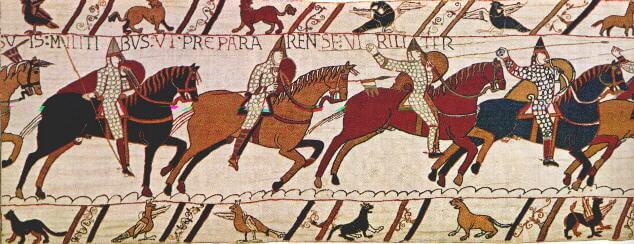Is Count Roland Actually Arrogant?

Many of the following observations are borrowed from Robert Francis Cook’s The Sense of The Song of Roland.
The Song of Roland contains two “horn scenes.” In the first horn scene, Oliver sees the Saracen army coming, is terrified, and tells Roland to blow his Oliphant and call for reinforcements. Roland declines to do so on the grounds it would be cowardly, though Oliver charges him with hubris. In the second horn scene, after the French army has been reduced from 20,000 to a mere 60, Roland prepares to sound his horn and Oliver accuses him of cowardice.
The difference between the first horn scene and the second is situational. In the first horn scene, the French are about to be attacked, though Roland has long known the attack was coming. When Roland and Charles part ways, shortly before Roland assumes command of the rear guard, both men are morose because neither expects to see the other again. Both Charles and Roland know they have been betrayed by Ganelon, though the all the evidence which confirms this (Charles’ prophetic dreams) is spectral and no just king can act on spectral evidence. Roland has volunteered for a suicide mission. He refuses Charles’ offer of more men for the rear guard not because he is arrogant, but because:
1. Roland wants Charles to have a suitably large army to protect him at the front of the pass.
2. An overly large rearguard is a sign the French do not take the peace treaty they have lately struck with the Saracens seriously.
Blowing his horn when the enemy approaches would be a sign of cowardice because Roland has known all along the Saracens would “ambush” the rearguard. It would be tantamount to climbing to the highest diving board at a pool, looking over the edge, and then climbing back down the ladder.
In the second horn scene, however, Roland blows his horn not for reinforcements, but to signal to Charles that the ambush has indeed taken place. The signal of the horn blasts (there are two) confirms for Charles that the French have been betrayed, and with the proof he has long needed, Charles immediately has Ganelon imprisoned. Roland does not latterly blow the horn because he is afraid for his life. Rather, he knows he is about to die and wants Charles to know the same.
I will happily grant that this interpretation of the Song is not terribly common among scholars, and that Cook is the only reader of the Song I have encountered who stands by every decision Roland makes. Most readers take the Song as a cautionary tale about pride. If the aforementioned account of Roland’s actions is not sufficient to tip the scales in Roland’s favor, I offer the curious events of laisse 148 as proof Roland is reasonable.
In laisse 148, Oliver has been wounded and is bleeding to death. So great is his blood loss that, “He can’t see far or near to know the form/ Or face of any man that comes before him,” and as Roland approaches the nearly-blind Oliver, Oliver “strikes out upward with his sword/ At Roland’s gemmed gold helmet.” Roland asks Oliver, “[A]re you hitting me on purpose? It’s Roland who loves you!” Oliver is immediately apologetic and Roland grants his forgiveness.
If Roland’s use of the horn is not proper (declining to use it first, later using it), it is difficult to account for this odd exchange; it is anomalous, an extreme outlier of the plot which does not resonate with anything else in the story. Where else is in the poem is there such a case of mistaken identity? However, if Roland’s use of his horn has been proper, then the events of laisse 148 serve as a token of Oliver’s “blind” condemnation of his friend. Just as Oliver has taken “swipes” at Roland earlier, he takes a final swipe at the end, though the author of the Song confirms all three swipes were done in ignorance.
What’s the upshot of all this? Roland has, from the beginning, discerned the situation for what it is. He knows the Saracens are not in earnest, he knows Ganelon has betrayed his own people, he knows he has seen Charles for the last time, and he knows that the Christians are duty-bound to accept a war ethic which continually makes them out to be suckers. Oliver does not know this, though Roland has patiently born his friend’s unwitting and unfair chastisement all along.
The righteous are often asked to endure the chastisements of well-meaning friends, even when those well-meaning friends don’t know what they’re talking about.

Joshua Gibbs
Joshua Gibbs teaches online classes at GibbsClassical.com. He is the author of How To Be Unlucky, Something They Will Not Forget, and Blasphemers. His wife is generous and his children are funny.










